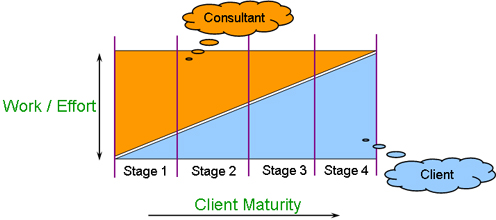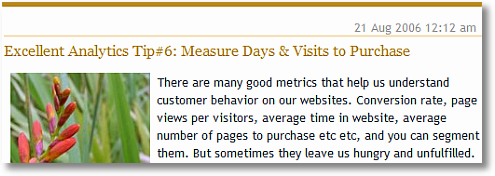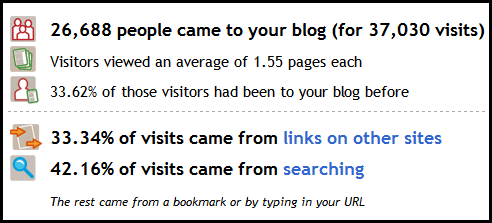 In the last five weeks I have given 20 plus speeches between my public and private speaking engagements. And I am not done yet, this week it's London and Amsterdam (Web Analytics Congres). Next week Barcelona (Practitioner Web Analytics).
In the last five weeks I have given 20 plus speeches between my public and private speaking engagements. And I am not done yet, this week it's London and Amsterdam (Web Analytics Congres). Next week Barcelona (Practitioner Web Analytics).
Whew!
So lots of time on planes (including writing this post as everyone around me is sound asleep), but it also means lots of questions from audiences I present to. I love the questions. You never know what people will ask and it is tough to provide an answer that will be cogent and insightful in two minutes.
My thought was that it would be cool to share some of these questions with you and see what you think of them. I am hoping that you'll learn something because they have been on your mind as well.
Or better still, you can tell me how I could have answered them differently. Please choose a question and use the comment form at the end to share your own answer with everyone! I am sure you disagree with atleast one of my answers!!
Here we go, actual questions and my actual answers. . . . .
Q1. Is it possible to separate Organic Search traffic from Paid Search traffic? We have been using Visual Sciences.
M'am, VisualSciences is by any stretch the most expensive web analytics tool on planet Earth. Not only will it be able differentiate between organic and paid search, but it is quite likely that someone from Visual Sciences will give you a massage while your report is running.
:)
Seriously though, I am constantly surprised at how vendors (all of 'em) promise the moon in the sales process and don't even take time to do the basics for their clients. Organic and Paid is one of those basics given the, atleast temporary, importance of search as an acquisition vehicle.
 Regardless of what your vendor says, all search traffic will usually be lumped in as Organic.
Regardless of what your vendor says, all search traffic will usually be lumped in as Organic.
Google Analytics is an exception because it will automatically split Paid (AdWords only) from Organic automatically if you have linked GA with your AdWords account. Even in that scenario other search engines will be in the Organic bucket unless you teach the tool how you are tagging/coding your search campaigns.
Every company and Agency tends to use different kinds of urls and redirects and parameters to encode search campaigns. Making it impossible for any web analytics tool to automatically detect paid search campaigns. But all you have to do is "teach" your web analytics tool what url parameters you are using and then going forward it will split organic and search campaigns.
Takes ten minutes, check with your vendor, absolutely worth investing that time.
Q2. I understand the value of the 4Q Surveys, but does anyone fill surveys online? I personally hate them and have never filled a single survey.
It is very important to not let yourself get in the way of listening to your customers. Let me tell you a story.
Several years ago a survey vendor came up to me after my talk and offered to let my company use their survey on our site for free for three months. I was not sure. This vendor's survey was ugly, 28 questions (!), all on one screen (!!) and the survey would pop up in the middle of the User's session on our site (!!!). I never did surveys and I said no.
The vendor persisted. There representative was sweet (notice importance of nice people) and I said ok (to take advantage of trying something that cost $60k per year).
I was positive it would fail.
At the end of the first three weeks, we got the first set of data. The response rate was 22%! That compared to the one percent average response rate of online surveys.
It shocked the bejesus out of me. Even with all its shortcomings our customers were completing the survey and the sharing incredible feedback with us. They just wanted a medium to talk to us.
I was glad I put aside my own strong opinions aside to try something. I recommend you do the same.

The nice thing is that with the 4Q online survey you can try for free. You can implement it when you want, you can take it off when you want, zero barriers to entry. Why not set aside your own "HiPPO" mindset and give it a try? You just might learn something like I did.
Bonus Link:
Q3. In your recommendation which Analytics tools is right for my business?
[This question always brings a big smile to my face. And at some level it makes me happy because everyone knows I am the Analytics Evangelist for Google, and yet they trust me enough to answer this question honestly. Would that not make you happy?]
It is tough for me to answer that question with no context about your business. Furthermore I do not believe that there is one tool that can be slapped on a site and result in nirvana (and a angels singing) for all sites.
But it is important to know that just like a life partner, there is perfect web analytics tool for you out there. It might not be right for me or Jennifer or Simon, but right for you. Hence it is important not to jump into bed with the first thing that comes along, or the most expensive or the one with the most aggressive sales force or the lowest price point.
![]()
There are posts on my blog you can read (below) but in a nutshell I recommend:
1) Don't do a traditional RFP, it almost always guarantees the worst possible outcome.
2) Tag your site, go with diverse vendors across the spectrum.
3) Ask them tough questions, I mean the ones that include common sense.
4) Before you choose anything ask yourself three questions.
Do that and I guarantee it, you would have found your soul mate.
Bonus links:
- How to Choose a Web Analytics Tool: A Radical Alternative
- Web Analytics Tool Selection: 10 Questions to ask Vendors
- Web Analytics Tool Selection: Three Questions to ask Yourself
Q4. After this talk I am totally sold on Experimentation & Testing, can you give me a few tips on how to approach my IT team and address concerns that they surely will have (with any idea from the business team!)?
Without a lot of context it is hard to answer the question, but let me try to see if I can provide a decent answer.
Tell them that you are going to stop bothering them (or greatly reduce it) about small things like creating small changes to pages or to create new pages for tests.  All they would have to do, to make their dream come true, is tag the site (add javascript tags on some pages) and then sayonara.
All they would have to do, to make their dream come true, is tag the site (add javascript tags on some pages) and then sayonara.
It is important to tell them that you, the company, retains control of the site and its security etc. All the testing platform (say the Google Website Optimizer or Offermatica or Optimost etc) will do is serve some of the content for the experiment automatically. The IT team does not every have to let go of their control of your Analytics tool, or create new reports because you'll be helping yourself.
Tell them that if the ASP based testing platform completely fails and dies, your website visitors will get the default version of the page. No harm to the customer experience. Worst case you don't have data for the test. No biggie.
Invite them to submit ideas about how to improve your site, tell them they can go head to head against the smarty pants in design "who insist that flash is the new black!". If you excite them, they will implement your testing platform tags!
Bonus links:
Q5. I love your 10/90 rule, is it still relevant?
I created that rule now almost three and half years ago, when I was at Intuit. If anything it has become even more relevant with each passing data.
Couple of reasons.
Free or inexpensive web analytics tools are getting better with each passing data. You can get a pretty nice free tool from all three search engines now, Microsoft AdCenter Analytics, Yahoo! Indextools, Google Analytics. And they will all continue to get better, helping you keep your tool costs down.
But perhaps the most important reason why the 10/90 is even more relevant now is that the web is even more complex now, customer experience and content consumption is ever more complex (and it is not just happening on your site!) and you truly need to invest in "big brains" to go get a grip on all that for your company and extract value from your tools.

The 10/90 does not say that you need to just get free tools.
Omniture's Genesis platform is a paid solution that will efficiently help you bring lots of data together from campaigns and other company sources. You can see how it is right for many companies. But if you are one of them then giving your Admin access or your part time analyst will not give you anything of value. Expansive sources mean more complexity, context digging, cows to herd, HiPPO's to deal with, data to link up……
Hire the right number of people and then set them free to help you extract the value you deserve, they will get you the ROI you crave. Without them you are dead, and its not the tool's fault.
People matter.
Bonus link:
Q6. I don't have any internal resources, what is the best way for me to start to extract all the value from WebTrends? We have had WebTrends for four years and only use it to report Visits and Page Views.
I am so sorry that you have not gotten more from it, you could have gotten Visits and Page Views from AWStats . WebTrends can do sooooo much more!
I have a non traditional recommendation for you to get value. Rather than running out and hiring a Analyst right away, I recommend that you go out and hire a consulting company to help you with reporting and analysis.
Does that sound odd?
My motive is simple. I want you to get on a rocket and move really really fast to extract value from the web analytics tool in which you have already invested so much money.

Get one of the all vendors consulting companies like Zaaz or Stratigent or get one of the vendor authorized ones (like the GAAC – Google Analytics Authorized Consultants). Set a plan for them to give you value added reports (first month), then move them to do analysis (month two to four) and then move them to start training your staff on how to fish (sorry, how to do web analytics!).
Throughout the process focus on getting business questions answered, don't settle for data pukes or crappy dashboards.
Bonus link (a specific four stage Consultant contract process):
Q7. What do you think of Alexa? I have been using it for a while, but you don't mention it on your blog and I am wondering if something's wrong with it.
It is my personal belief that Alexa is past its prime. It was a decent source a while back when there were fewer people on the web, the Alexa toolbar was widely used, and its sample was good enough.
Now there are a lot more sources of better competitive intelligence data. Better in terms of sample size, methodology applied and metrics available. So while Alexa might still be ok for the most heaviest used sites in the world, you can actually do a lot better.
 If you are looking for a great free solution then I am rather fond of Compete. They use many different kinds of data collection methods (not just toolbar) and provide very nice metrics, give it a whirl. Their Search Engine / Keywords data is also very good as well, though it is a paid solution.
If you are looking for a great free solution then I am rather fond of Compete. They use many different kinds of data collection methods (not just toolbar) and provide very nice metrics, give it a whirl. Their Search Engine / Keywords data is also very good as well, though it is a paid solution.
If you would like to get a paid solution then you can hardly go wrong with HitWise. Large sample of data, and currently your only good source for international websites / traffic.
Both of these sources don't publish website rankings (part of Alexa's old attraction), but there is more to life than ranks.
There are large buckets of other data out there that could provide very robust competitive intel, I think things are only going to get better for us Analysts!
Bonus link:
Q8. Is it possible to identify to the web analytics tool that they are a "prospect" (new customers) or existing customer?
You should be able to do this with most tools today, as long as you (the website platform) has the capacity to identify that someone is a new customer or a prospect.
A common example is a bank, they just want to know what is their "real traffic" – All Visitors minus Visitors who log into their accounts.
 You can simply pass the fact that someone logged into their account to your web analytics tool and then segment the data in your tool and its happy birthday.
You can simply pass the fact that someone logged into their account to your web analytics tool and then segment the data in your tool and its happy birthday.
In Google Analytics you can do this via the User Defined Value field. With other tools you can pass "evars" or "variables" or "gremlins". Ok that last one is a joke.
Just ask your vendor, this is not that hard to do.
If your vendor says that there is no way to pass a value, then you could still use either a URL parameter or set a cookie value to add this information to a session. This will need a small amount of technical work, just take your IT person out on a date and they will do it for you.
Either way you should be able to capture a customer attribute or the fact that they took some action on your site.
Q9. What are a couple of non intuitive marketing metrics that we can use to measure our online campaigns?
Pause.
Good question, with only the info in the question there are lots of answers. :)
Here are two that come to mind.
1) Do pan session analysis.
Most reports in web analytics tools are focused towards measuring activity within single sessions. That is rarely the customer behavior. All great analysts are good at doing pan session analysis to measure true customer behavior on the site.
A good example of this is measuring Days To Purchase (action) or Visits To Purchase.

Another excellent example of this is doing campaign attribution analysis. Most tools will give "credit" to the first or the last campaign, you leave it to you to choose which. Some like CoreMetrics provide additional functionality to measure across sessions, others require you to buy their data warehouse solutions. Doing pan session attribution analysis can be quite insightful in understanding core drivers to conversion.
2) Get good at media mix modeling.
"Offline" Direct Marketing folks typically are awesome at this. Somehow us online folks usually stink at it, or have never heard of it.
You are executing many different things all at the same time. Why look at them in a silo? Why now pull all of it into one nice big picture and look at performance across various media (/acquisition channels) that you purchase? Why not use that to create models that can give your Marketers a solid idea of how to spend their finite budgets to gain maximum ROI?
Takes some work. Totally worth it.
Bonus link:
Q10. How can I believe anything from web analytics tools when there are no standards for any metrics?
I have to admit that I have to work hard at not rolling my eyes on this one. And it upsets me a little because it reminds me that we would rather argue about standards than use the delightful data we do have to make decisions and get on with our lives!
Standards are good and standards in some cases are important. But in a young industry like Web Analytics not having standards can't be a barrier to actually making productive use of data.
So yes ClickTracks will measure sessions very different than Omniture, but it will do so consistently and unless you are looking for what one human did, I don't think it matters that much. Just segment your data, look at trends and please take action, there is a lot you can action from data (from any web analytics tool!).
Until recently I was the the WAA Director responsible for Standards, if nothing else that should show how much I believe in having Standards. Angie and Judith are doing a fantastic job of creating new standards (beyond the 28 we already have). Now the brave Jodi is helping do the same for Social Media / Web 2.0. We can't wait for them.
But you should not wait for them to take action. Do that now.
Bonus link:
Q11. What is one prediction you can make about Web Analytics?
[People always ask me: Where will web analytics be in five years? My answer always is: If anyone tells you that they know then they are full of. . . . . :)]
Predictions can have a nasty habit of coming wrong, but I'll go out on a limb and say that Web Analytics tools will become much much simpler and make it astonishingly easy to understand data (even as they continue to capture complex customer interactions, applying advanced math and statistics, and even apply a pinch of AI!).
Here's an example:

Isn't it the greatest visitor "dashboard" ever? No technical crap or mumbo jumbo, just a story of what's happening on your site. Even my mom understands what it means.
The screenshot's from the humbly named tool: Blog Stats.
I am positive this will happen a lot more, and across tools. It has to happen if we have to go truly big as a industry.
Q12. I am not going to use Google because I don't know what they are doing with my data, I am never going to use Google Analytics.
I respect your choice.
Though I would be remiss if I did not add that Google is the only company with a free tool that provides you with a explicit choice when it comes to what happens to your data. (And I have to admit that I am rather proud of this.)
In Admin settings you'll notice a Data Settings area. In this area you get three choices in terms of your data collected via Google Analytics.
 * You can choose to share it with Google and have them look at that data anonymously (i.e all identifiers of your site are stripped away -things like www.awesomelycoolwidgets.com).
* You can choose to share it with Google and have them look at that data anonymously (i.e all identifiers of your site are stripped away -things like www.awesomelycoolwidgets.com).
* You can choose to share it with Google and have them know it is your data (i.e with the identifiers such as urls etc).
* You can choose not to share it with Google (i.e essentially tell Google to keep your data on an island and not allow anyone, including Google, to look at it).
You are in control and Google will abide by your choice.
I hasten to add that this does not mean everyone should use Google Analytics. It also does not mean that everyone will be convinced, that is ok.
But atleast you know. And that's a good thing! :)
Q13. What are two of your favorite online to offline metrics?
Pause.
Trying to think really hard, really fast.
Hmm…. :)
I am so sorry but that is a very complex question and my answer would really depend on who you are, what you are trying to do, what the competitive environment is and so much more.
If you really push me I would say that figure out how to measure two metrics: something outcomes related (hard impact in revenue etc on offline conversions / outcomes) and, this one's specific, Likelihood To Recommend (I love this metric because regardless many differentiators, your website should be creating Net Promoters).
- – -
Ok now its your turn.
If you are up for it I would love for you to pick a question from the above 13 and tell me how you would have answered it. That will help make all of us a little smarter, and I'll know of something impressive to say next time I get that question.
Won't you please contribute your perspectives? Thanks much.

 Two things in this post:
Two things in this post:
 I am very proud of Web Analytics: An Hour A Day, it has sold beyond my wildest dreams (and is still on the top 1,000 books sold on Amazon almost every day, 11 months later!).
I am very proud of Web Analytics: An Hour A Day, it has sold beyond my wildest dreams (and is still on the top 1,000 books sold on Amazon almost every day, 11 months later!).



 I think the only condition is that you give something remarkable and of value to your readers.
I think the only condition is that you give something remarkable and of value to your readers.